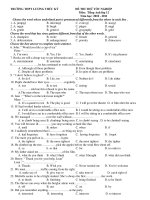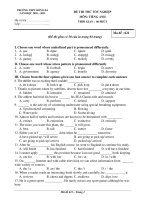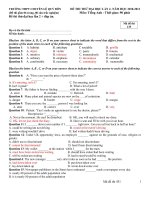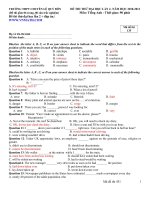- Trang chủ >>
- THPT Quốc Gia >>
- Ngoại Ngữ
ĐỀ THI THỬ THPT QUỐC GIA TIẾNG ANH CHỌN lọcl THPT việt yên số 1 bắc giang
Bạn đang xem bản rút gọn của tài liệu. Xem và tải ngay bản đầy đủ của tài liệu tại đây (213.17 KB, 6 trang )
THPT VI T YÊN S
L
Đ THI TH
THPT QU C GIA NĂM
Môn Ti ng Anh
ng Thùy LB s u t m và gi i thi u
Th i gian làm bài 60 phút
Mark the letter A, B, C or D on your answer sheet to indicate the word
that differs from the other three in the position of the primary stress in
each of the following questions.
Question 1: A. compulsory
Question 2: A. history
B. certificate
B. confide
C. significant
C. result
D. category
D. suggest
Mark the letter A, B, C or D on your answer sheet to indicate the
sentence that is closest in meaning to each of the following questions.
Question 3: “Leave my house now or I’ll call the police!” shouted the lady to
the man.
A. The lady said she would call the police if the man didn’t leave her house.
B. The lady told the man that she would call the police he didn’t leave her
house.
C. The lady informed the man that she would call the police if he didn’t leave
her house.
D. The lady threatened to call the police if the man didn’t leave her house.
Question 4: He last has his eyes tested ten months ago.
A. He had tested his eyes ten months before.
B. He didn’t have any test on his eyes ten months before.
C. He had not tested his eyes for ten months then.
D. He hasn’t had his eyes tested for ten months.
Question 5: He survived the operation thanks to the skillful surgeon.
A. He survived because he was a skillful surgeon.
B. He wouldn’t have survived the operation without the skillful surgeon.
C. There was no skillful surgeon, so he died.
D. Though the surgeon was skillful, he couldn’t survive the operation.
Mark the letter A, B, C or D on your answer sheet to indicate the
word(s) OPPOSITE in meaning to the underlined word(s) in each of the
following questions.
Question 6: My younger brothers are obedient most of the time, but they are
quite mischievous sometimes.
A. Naughty
B. hard-working
C. well-behaved
D. disruptive
Question 7: You should not wear casual clothes to the interview. The first
impression is very important.
A. New
B. informal
C. neat
D. formal
Mark the letter A, B, C or D on your answer sheet to indicate the
word(s) CLOSEST in meaning to the underlined word(s) in each of the
following questions.
Question 8: In daily communication, you
people’s body language.
A. Understand
B. answer
Question 9: The purpose of this survey
toward love and marriage.
A. Find out
B. develop
should know how to interpret other
C. respond
D. notice
is to determine students’ attitudes
C. concern
D. build
Read the following passage and mark the letter A, B, C, D on your
answer sheet to indicate the correct answer to each of the questions.
Who talks more – men or women? Most people believe that women talk
more. However, linguist Deborah Tannen, who has the studied the
communication style of men and women, says that this is a stereotype. According
to Tannen, women are more verbal – talk more – in private situations, where
they use conversation as the “glue” to hold relationship together. But, she says,
men talk more in public situations, where they use conversation to exchange
information and gain status. Tannen points out that we can see these difference
even in children. Little girls often play with one ‘best friend’ and their play
includes a lot of conversation. Little boys often play games in groups, their play
usually involves more doing than talking. In school, girls are often better at verbal
skills, while boys are often better at mathematics.
A recent study at Emory University helps to shed light on the roots of this
difference. Researchers studied conversation between children aged 3-6 and
their parents. They found evidence that parents talk very differently to their sons
than they do to their daughters. The startling conclusion was that parents use
more language with their girls. Specifically, when parents talk with their
daughters, they use more descriptive language and more details. There is also
far more talk about emotions, especially with daughters than with sons.
Question 10: Which sentence best expresses the main idea of the first
paragraph?
A. Women talk more than men on the whole
B. Women’s talking is a stereotype
C. Women talk more in private, and men talk more in public
D. Little boys and little girls have different ways of playing
Question 11: Which word is similar in meaning to the word “glue”?
A. Games
B. sticky substance C. rope
D. means
Question 12: Which of the following phrases best explains the meaning of the
word “verbal”?
A. Deriving from verbs
B. Connected with use of spoken language
C. Using very loud noise
D. Being very talkative
Question 13: The word “they” refers to ______.
A. Situations
B. Men
C. Men and women
D. Women
Question 14: Which of the following can be inferred from the first paragraph?
A. Men and women have different styles of talking, which may begin in
childhood.
B. According to Deborah Tannen, the belief that women talk more is party
right but most wrong.
C. Women talk more in some situations while men talk in others
D. Men are more sociable than women
Question 15: Which sentence best expresses the main idea of the second
paragraph?
A. Researchers have studied the conversations of children and their parents.
B. Parents do not much about sadness with their sons.
C. Study at Emory University can help to explain the differences between
communication styles of boy and girls.
D. An Emory University study found than parent talk more with their
daughters than with their sons.
Question 16: Which word can best replace the word “startling”?
A. beginning
B. annoying
C. surprising
D. interesting
Question 17: Which of the following statement is TRUE about the passage?
A. Parents give more love to their daughters than to their sons
B. Boys don’t like to be with their parents as much as girls do
C. Parents use more language to talk with their daughters
D. Boys don’t like showing emotions
Read the following passage and mark the letter A, B, C, D on your
answer sheet to indicate the correct answer to each of the questions.
Face-to-face conversation is a two-way process: You speak to me, I reply
to you and so on. Two-way (18)_______ depends on having a coding system
that is understood by both sender and (19)_______, and an agreed convention
about signaling the beginning and end of the message. In speech, the coding
system is the language like English or Spanish; the convention that one person
speaks at a time may seem too obvious to mention. In fact, the signals
(20)_______ in conversation and meetings are often (21)_______. For example,
lowering the pitch of the voice may mean the end of a sentence, a sharp intake
of breath may signal the desire to interrupt, catching the chairman’s eye may
indicate the desire to speak in a formal setting like a debate, a clenched fist may
indicate anger. When (22)_______ visual signals are not possible, more formal
signals may be needed.
Question 18:
A. Exchange
B. Receiver
C. Communication
D. Correspondence
Question 19:
A. Announcer
B. Interchange
C. Messenger
D. Transmitter
Question 20:
A. That people use B. Are used
C. Using
D. Being used
Question 21:
A. Informal
B. non-verbal
C. verbal
D. formal
Question 22:
A. their
B. These
C. This
D. That
Mark the letter A, B, C or D on your answer sheet to indicate the correct
answer to each of the following questions.
Question 23: The state school system is free for all students and _______ by
the government.
A. Is paid for
B. is paying for
C. pays for
D. is being pay for
Question 24: Jane got married_______ Peter two years ago, but now they have
split
A. As
B. with
C. for
D. to
Question 25: The H5N1 infected patients have to _______ others to prevent
the virus from spreading
A. Take care of
B. get away
C. look after
D. stay away from
Question 26: Whenever I have problems, Jane is always very dependable. She
never ______.
A. Turns up
B. let me down
C. turns me off
D. turns out
Question 27: Students are expected to write their homework slowly and
_______.
A. Careless
B. carefully
C. carelessly
D. careful
Question 28: During the interview, you should try to ____ a good impression
on your interview.
A. Create
B. have
C. give
D. try
Question 29: An academic year in Vietnam is divided _____ two terms
A. In
B. into
C. within
D. from
Question 30: Global warming is obviously _______ a worrying influence on the
climate worldwide
A. Having
B. making
C. giving
D. taking
Question 31: He wanted to know whose car I borrowed _____
A. Yesterday
B. evening the last evening
C. last night
D. the previous night
Question 32: The man to _______ we have just talked is the Director General
A. Who
B. that
C. whom
D. 0
Question 33: Though built in 1946, computers were sold ______ for the first
time in the 1950s
A. Commercial
B. commercialise C. commercially
D. commerce
Question 34: ______hard, you will get good results in the coming examination.
A. Should you work
B. unless you work
C. if you will work
D. if work
Read the following passage and mark the letter A, B, C, D on your
answer sheet to indicate the correct answer to each of the questions
from 35 to 41.
Stars have been significant features in the design of many United States
coins and their number has varied from one to forty-eight stars. Most of the
coins issued from about 1799 to the early years of the twentieth century bore
thirteen stars representing the thirteen original colonies.
Curiously enough, the first American silver coins, issued in 1794, had fifteen
stars because by that time Vermont and Kentucky has joined the Union. At that
time it was apparently the intention of mint officials to add a star for each new
state. Following the admission of Tennessee in 1796, for example, some varieties
of half dimes, dimes, and half-dollars were produced with sixteen starts.
As more states were admitted to the Union, however, it quickly became
apparent that this scheme would not prove practical and the coins from A798 on
were issued with only thirteen stars-one for each of the original colonies. Due to
an error at the mint, one variety of the A828 half cent was issued with only
twelve stars. There is also a variety of the large cent with only A2 stars, but this
is the result of a die break and is not a true error.
Question 35: What is the main topic of the passage?
A. Stars on American coins
B. The teaching of astronomy in state universities
C. The star as national symbol of the United States
D. Colonial stamps and coins
Question 36: The word “their” in line 1 refers to _______
A. Coins
B. features
C. colonies
D. stars
Question 37: The word “bore” in line 3 is closest in meaning to ________
A. Carried
B. drilled
C. symbolized
D. cost
Question 38: The expression “Curiously enough” is used because the author
finds it strange that …
A. Silver coins with fifteen stars appeared before coins with thirteen
B. Vermont and Kentucky joined the Union in 1794
C. Tennessee was the first state to use half dimes
D. No silver coins were issued until 1794
Question 39: Which of the following can be inferred about the order in which
Kentucky, Tennessee, and Vermont joined the Union?
A. Vermont joined after Tennessee and Kentucky.
B. Kentucky joined before Tennessee and Vermont.
C. Tennessee joined Vermont and Kentucky.
D. Vermont and Kentucky joined at the same time.
Question 40: Which of the following is NOT mentioned as the denomination of
an American coin?
A. Half cent
B. Half-dollar
C. Half dime
D. Half nickel
Question 41: Why was a coin produced in 1828 with only twelve stars?
A. There was a change in design policy.
B. There were twelve states at the time.
C. The mint made a mistake.
D. Tennessee had left the Union.
Mark the letter A, B, C, or D on your answer sheet to indicate the
underlined part that needs correction in each of the following
questions.
Question 42: (A)If you take (B)the train, it (C)would be (D)much more
convenient.
Question 43: (A)Some of his favourite (B)subjects at school (C)are Maths,
English and (D)Geographical.
Question 44: (A)Could you tell (B)me (C)how can I get to (D)the city library,
please?
Mark the letter A, B, C or D on your answer sheet to indicate the
sentence that best combines each pairs of sentences in the following
questions.
Question 45: They were rich; they didn’t have a happy family, though.
A. Although they were rich, but they didn’t have a happy family.
B. Rich though they were, they didn’t have a happy family.
C. They were rich although they didn’t have a happy family.
D. However they were rich, they didn’t have a happy family.
Question 46: One student failed because he completely ignored the instruction
on the paper. The instructions appeared on the top of every page.
A. One student failed because he completely ignored the instructions
appearing on the top of every page on the paper.
B. Even though one student ignored the instructions printed on the top of
every paper, he failed.
C. One student failed to ignore the instructions printed on the top of every
page of paper.
D. No matter how completely one student ignored the instructions printed on
the top of every page of the paper, he failed.
Mark the letter A, B, C or D on your answer sheet to indicate the most
suitable response to complete each of the following exchanges.
Question 47: Peter and Bob are talking about the plan for tonight.
Peter: “_________________.”
Bob: “I’d love to. Thank you.”
A. Would you like to go to the new coffee shop with me?
B. What would you do if you can afford a new car?
C. Would you like a cake?
D. Why do you spend so much time playing games?
Question 48: Two people are talking on the phone.
A: “Could I speak to Alex, please?” - B: “___________________.”
A. Can I take the message?
B. I’m sorry. Alex is not in.
C. Just a moment. I’m coming.
D. This is Joe speaking.
Mark the letter A, B, C or D on your answer sheet to indicate the word
whose underlined part differs from the other three in pronunciation in
each of the following questions.
Question 49: A. imports
B. groups
Question 50: A. technology B. chores
1D
11B
21C
31D
41C
2A
12B
22B
32C
42C
3D
13B
23A
33C
43D
4D
14C
24D
34A
44C
ÁP ÁN
5B
6C
15D
16C
25D
26B
35A
36D
45B
46A
C. techniques
C. schooling
7D
17C
27B
37B
47A
8A
18B
28A
38A
48B
D. computers
D. chemistry
9A
19B
29B
39D
49C
10D
20A
30A
40D
50B









